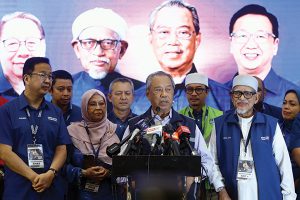Bloomberg
Two Malaysian coalitions said they’re confident of getting enough support from outside their existing alliances to form a new government after the country’s first-ever hung parliament.
Anwar Ibrahim’s Pakatan Harapan coalition got the most parliamentary seats — 82 of 220 — in Saturday’s vote, with former premier Muhyiddin Yassin’s Perikatan Nasional not far behind at 73. Prime Minister Ismail Sabri Yaakob’s Barisan Nasional had 30, as a gamble to hold early elections failed.
A coalition needs 111 seats to form a majority, while by-elections will be held for two constituencies later. In early morning press conferences, Anwar said he has enough support from other allies to cross the threshold, while Muhyiddin said he will be speaking to parties in Borneo to get there.
All three alliances suffered losses of major party figures. Finance Minister Zafrul Aziz, Trade Minister Azmin Ali and Health Minister Khairy Jamaluddin all failed to get elected. Former Prime Minister Mahathir Mohamad, 97, lost in Langkawi and his Pejuang party failed to win a single seat.
Saturday’s vote may extend a political crisis that has seen the government change three times in four years and hampered efforts to bring down the cost of living and rein in a growing deficit in the aftermath of spending to shield the economy from the pandemic.
“The results may fail to ease concerns over the recent phase of political instability,†said Stephen Innes, managing partner at SPI Asset Management. “Still, there will be no earthquake reaction like we saw post the 2018 election, and given the hung government was a consensus, I expect the market will take the result in stride.â€
As the coalitions turn to horse-trading to form an alliance, Malaysia’s king will also play a key role. Anwar and Muhyiddin will have to show him they each have the numbers to form a government, as was the case in the formation of the last two administrations.
If that fails, the king may determine which leader he believes commands majority in parliament, though this would not be tested publicly until parliament reconvenes, said New Sin Yew, a constitutional lawyer at AmerBON Advocates.
This election wasn’t due until September 2023, but the United Malays National Organisation, the linchpin of BN, wanted it earlier to capitalize on a slew of local poll victories as well as what they saw as an opposition in disarray.
BN waged a very muted campaign due to infighting within UMNO over the selection of candidates while other pro-Malay coalitions attacked its track record in governance, reminding voters of leaders facing corruption cases.
While it won the most seats as predicted by pollsters, Anwar’s PH will have a tougher time forging alliances with the two pro-Malay blocs. That’s partly because PH’s coalition government under Mahathir collapsed in 2020 as lawmakers working with Muhyiddin broke away and joined forces with UMNO.
Muhyiddin said in an early morning press conference that his coalition won’t work with Anwar’s. PH’s best bet lies with a regional party in Sarawak that has traditionally thrown its support behind the coalition with the most seats nationwide.
BN said it “accepts and respects the people’s decision†after Malaysia’s incumbent coalition took a beating in the hotly contested election.
“BN is prepared to set aside past differences to contribute toward the realization of a stable government,†Chairman Ahmad Zahid Hamidi said in a statement. The coalition will focus on restoring the party’s strength, and is “prepared be a bridge between peninsular Malaysia and Borneo island,†he said.
 The Gulf Time Newspaper One of the finest business newspapers in the UAE brought to you by our professional writers and editors.
The Gulf Time Newspaper One of the finest business newspapers in the UAE brought to you by our professional writers and editors.
